Post Study Work Options: How to Get a Work Visa in Ireland After Your Studies

The Republic of Ireland occupies most of the island of Ireland, off the coast of England and Wales. It may be a small island but Ireland is packed full of incredible attractions and has been dubbed the “Emerald Isle” for its lush landscape
Ireland is considered the door to Europe not only because of its geographical location but also because you can find a lot of low-cost flights to the rest of Europe from Dublin, Belfast and other major airports in the country. After completing your studies, you do not have to limit yourself to in one place if you want to continue living in Ireland.
With over 1,000 leading multinational companies operating in the country like Google, Apple and Microsoft, Ireland is one of the most popular destinations for international students in Europe. Not to mention that a lot of Irish universities have been listed in the world ranking of most popular institutions.
Irish people are known to be friendly and hospitable which is a big help for international students to adapt to the way of life in a foreign land.
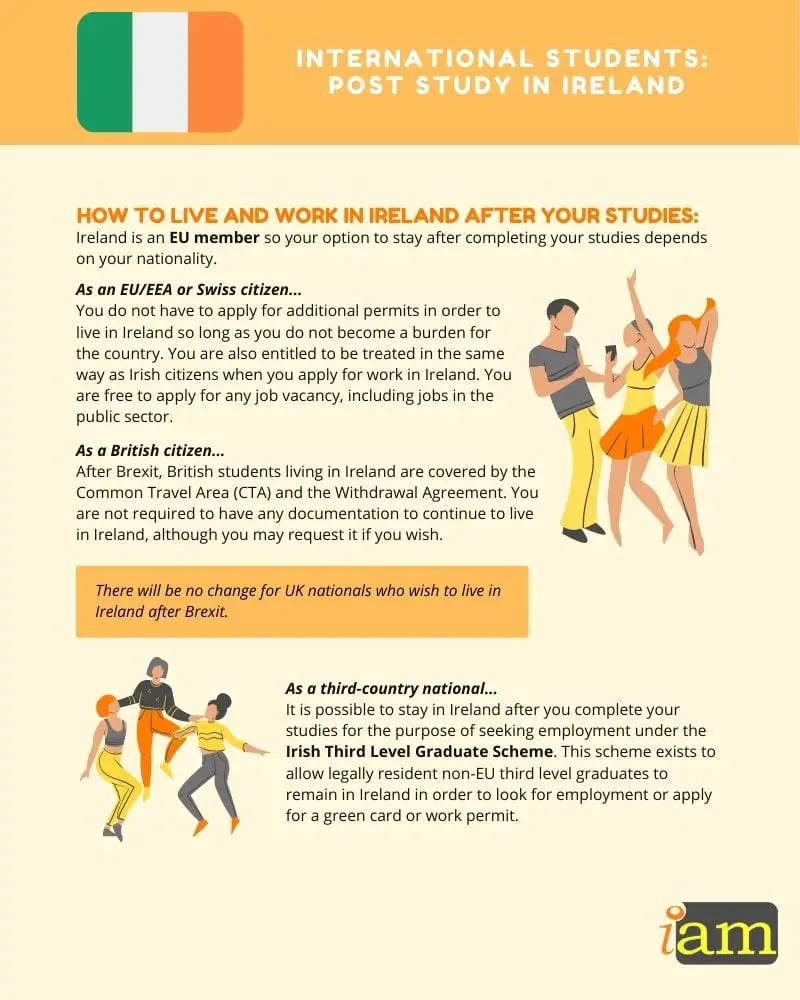
Ireland is an EU member so your option to stay after completing your studies depends on your nationality. EU/EEA or Swiss students do not have to apply for additional permits in order to live in Ireland so long as you do not become a burden for the country. You are also entitled to be treated in the same way as Irish citizens when you apply for work in Ireland. You are free to apply for any job vacancy, including jobs in the public sector.
After Brexit, British students living in Ireland are covered by the Common Travel Area (CTA), which is an agreement by Ireland and the UK, and the Withdrawal Agreement, which is an agreement between the EU and the UK.
Therefore, British nationals in the country will continue to travel freely, live, work and have access to education, healthcare and social services after the UK leaves the EU. You are not required to have any documentation to continue to live in Ireland after 31 December 2020, although you may request it under the Withdrawal Agreement if you wish.
There will be no change for UK nationals who wish to live in Ireland after 31 December 2020.
For non-EU/EEA and Swiss students, it is possible to stay in Ireland after you complete your studies for the purpose of seeking employment under the Irish Third Level Graduate Scheme. This scheme exists to allow legally resident non-EU third level graduates to remain in Ireland in order to look for employment or apply for a green card or work permit.
Check out the options below if you wish to stay in Ireland after your studies, or check out our other blog posts if you want to know your post-study work options in the USA, Australia, Canada, the UK or other European countries!
Related articles:
- Best Cities to Live in the UK as a Student
- Iceland Post Study Work Visa – How to Get a Work Visa for Iceland
- Post Study Work Options: How to Get a Belgium Work Visa After Your Studies
- Post Study Work Options: How to Get a Work Visa in Denmark After Your Studies
Third Level Graduate Programme
The programme is to allow legally resident Irish educated non-EU/EEA graduates holding an award of a recognised Irish awarding body to remain in Ireland after their studies. This should be for the purpose of seeking graduate-level employment and applying for either a general employment permit, a critical skills employment permit, or a research hosting agreement. It is strongly advised to have sufficient time to have your registration renewed and revised immigration permission arranged before your current permission expires. Your application will be rejected if your current permission to stay in Ireland has lapsed.
The Irish degrees are separated into 10 levels according to the National Framework of Qualification (NFQ) that is based on nationally agreed standards of knowledge, skill and competence. The NFQ levels for higher education starts at level 6 which refer to higher certificate programs before a Bachelor's degree. These are usually short-term courses and do not offer access to the Third Level Graduate Scheme.
The table below shows the NFQ system from Level 7 to 10.
| NFQ Level | Degree Awarded | Duration |
| Level 7 | Ordinary Bachelor's Degree | 3 years |
| Level 8 | Honor's Bachelor's Degree | 3-4 years |
| Level 9 | Post Graduate DiplomaMaster's Degree | 1 year1-2 years |
| Level 10 | Doctoral Degree | 4 + years |
This programme is for graduates who have completed their studies in Ireland and have been awarded a qualification at Level 8 or above of the National Framework of Qualifications by a recognised Irish awarding body.
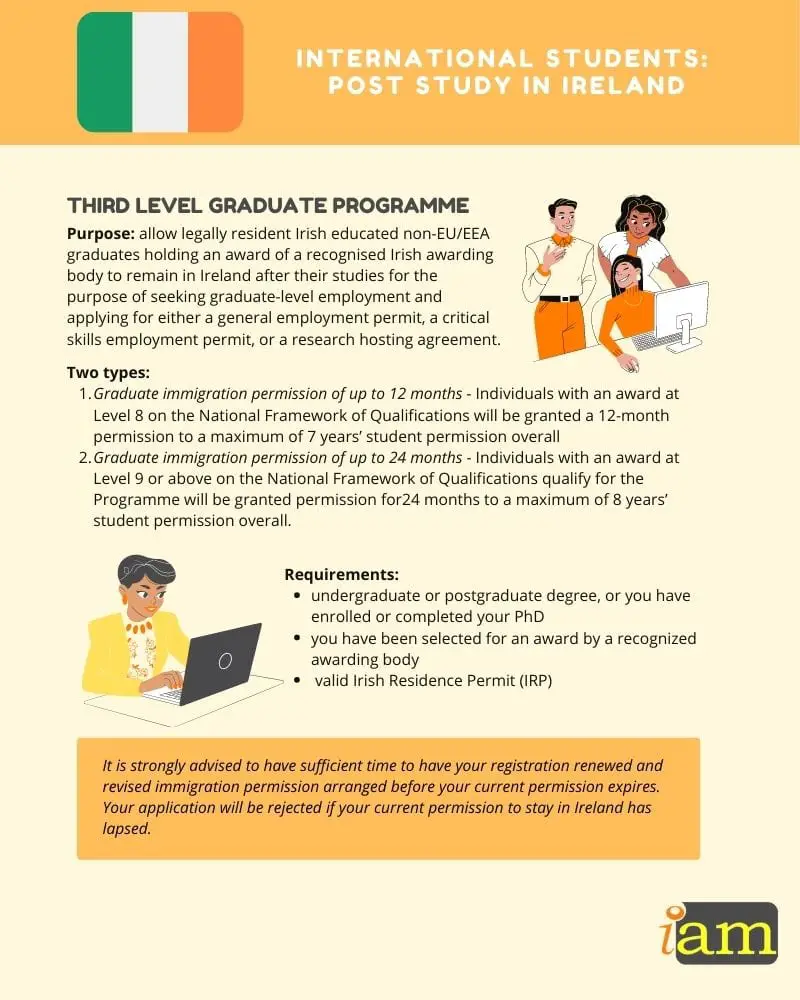
The Irish awarding body are:
- The seven Irish universities; i.e. Trinity College, UCD, DCU, Maynooth University, UCC, NUIG and the University of Limerick
- Dublin Institute of Technology
- Royal College of Surgeons Ireland
- Institutes of Technology
- Quality and Qualifications Ireland (QQI)
There are two type of permission under the programme:
- Graduate immigration permission of up to twelve months
Individuals with an award at Level 8 on the National Framework of Qualifications will be granted a twelve-month permission to a maximum of seven years' student permission overall
- Graduate immigration permission of up to twenty-four month
Individuals with an award at Level 9 or above on the National Framework of Qualifications qualify for the Programme will be granted permission for twenty-four months to a maximum of eight years’ student permission overall.
In order to qualify for the programme, you should meet the following conditions:
- you have an undergraduate or postgraduate degree or you have either enrolled or completed with your PhD
- you have been selected for an award by a recognized awarding
- you are having a valid Irish Residence Permit (IRP)
General Employment Permit
This permit covers all occupations and may be obtained in respect of a 12-month contract of employment. The permit can be issued for an initial period of two years and can then be renewed for up to a further three years. After five years, you may apply to the Immigration Service Delivery (ISD) for long term residency.
To qualify, you should meet the following conditions:
- existing job offer in Ireland
- must have all the appropriate skill, experience and qualification for the role
- this permit is subject to Labor Market Needs test, which means employers must have advertised the position within the EEA before the position it was offered to non-EU/EEA nationals
- Meets the minimum annual salary of €30,000 or €27,000 in respect of a non-EEA student – who has graduated in the last 12 months, from an Irish third level institution, and has been offered a graduate position from the Critical Skills Occupations List. Upon renewal, minimum annual remuneration must be €30,000
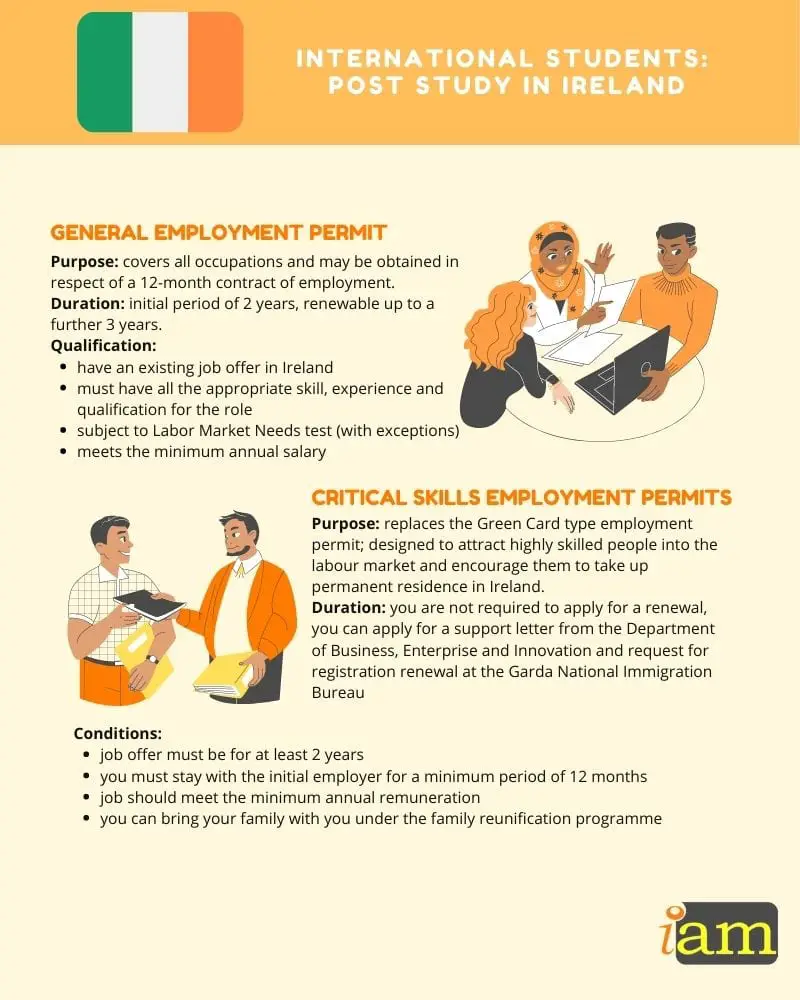
You can also be exempted from the Labor Market Test rule if:
- The job is on the Critical Skills Occupations List
- The job offer is in respect of an eligible employment with a minimum annual remuneration of €64,000
- The job offer is for a Carer of a person with exceptional medical needs and the non-EEA national has been providing care to the person before the application was made and that person has developed a high level of dependence on that non-EEA national.
You should prepare the following documents:
- A copy of your passport, which shows your picture, signature, and personal details.
- Passport-size picture in line with Ireland photo requirements.
- A copy of the work contract signed by you and the employer.
- If you are a resident in Ireland at the time of application, a copy of your current immigration stamp.
- Details of a contact person: name, position in company, phone number and email address.
- Relevant Registration/Pin or License number of the company issued by the appropriate Irish Regulatory bodies or Government Ministers.
- Copy of the letter of support by IDA/Enterprise Ireland, if applicable.
- Details of your employer, such as company registration number, address, name, and relevant certificates from authorized bodies.
- Details of your employment, such as your salary, work responsibilities, duties, and duration.
The processing fee for a new General Employment Permit is:
- €500 for an employment permit of 6 months or less duration or
- €1,000 for an employment permit from 6 months up to 24 months duration.
An application for the permit must be received at least 12 weeks before the proposed employment start date. Upon the receipt of the employment permit, you must register to change your residence status with the Garda National Immigration Bureau.
Critical Skills Employment Permits
The Critical Skills Employment Permit replaces the Green Card type employment permit. The Critical Skills Employment Permit is designed to attract highly skilled people into the labour market with the aim of encouraging them to take up permanent residence in Ireland.
The job offer must be for at least 2 years and you are expected to stay with the initial employer for a minimum period of 12 months. The job should have a minimum annual remuneration of €32,000.
You should prepare the following documents:
- A copy of your passport, which shows your picture, signature, and personal details.
- Passport-size picture in line with Ireland photo requirements.
- A copy of the work contract signed by you and the employer.
- If you are a resident in Ireland at the time of application, a copy of your current immigration stamp.
- Details of a contact person: name, position in company, phone number and email address.
- Relevant Registration/Pin or License number of the company issued by the appropriate Irish Regulatory bodies or Government Ministers.
- Copy of the letter of support by IDA/Enterprise Ireland, if applicable.
- Details of your employer, such as company registration number, address, name, and relevant certificates from authorized bodies.
- Details of your employment, such as your salary, work responsibilities, duties, and duration.
The processing fee for a Critical Skills Employment Permit is €1,000. Upon receipt of the employment permit, you must register the change of your residence status with the Garda National Immigration Bureau.
The advantage of this permit is you will not be required to apply for a renewal, instead you can apply for a support letter from the Department of Business, Enterprise and Innovation and then request for registration renewal at the Garda National Immigration Bureau with the support letter, your existing Critical Skills Employment Permit or Green Card Employment Permit, passport and your Garda Naturalisation Immigration Bureau card.
With this permit, you can bring your family with you under the family reunification programme.
Immigrant Investor Programme (IIP)
The Immigrant Investor Programme (IIP) is open to non-EEA nationals who commit to an approved investment in Ireland. The Immigrant Investor Programme requires a minimum investment of €1 million, from your own resources and not financed through a loan or other such facility, which must be committed for a minimum of three years.
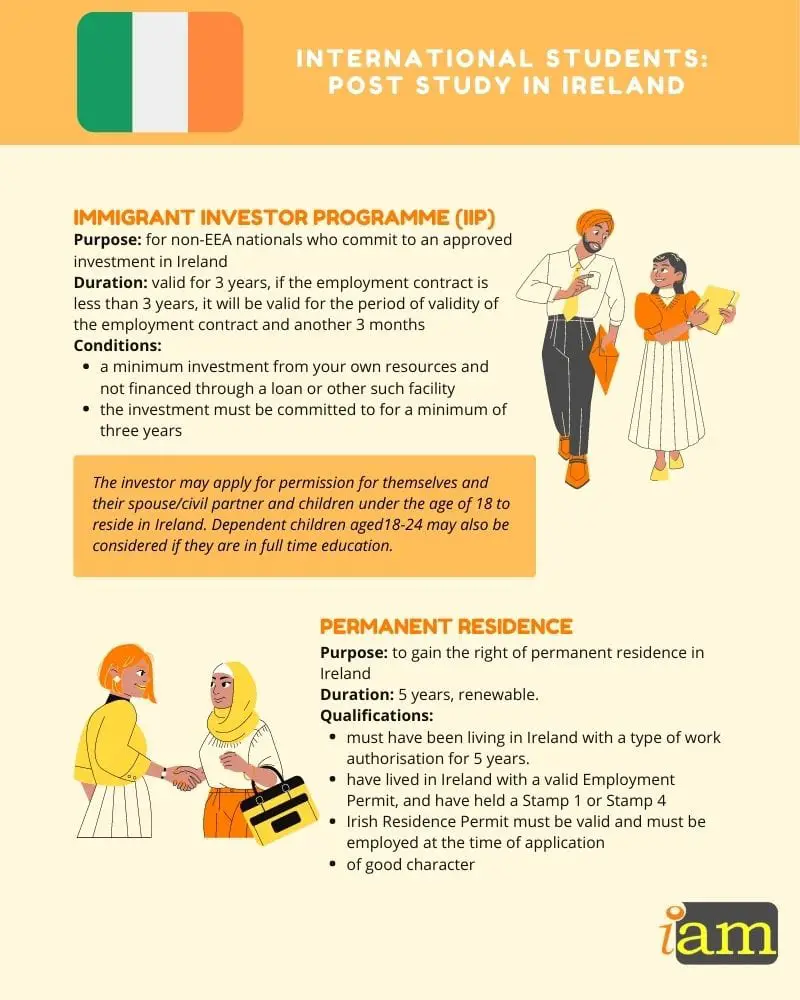
The programme offers four investment options for potential investors:
- Enterprise Investment – A minimum of €1 million invested in an Irish enterprise for a period of at least 3 years.
- Investment Fund – A minimum of €1 million invested in an approved investment fund for a period of at least 3 years. Such funds must be approved and regulated by the Central Bank.
- Real Estate Investment Trusts (REIT) – A minimum investment of €2 million in any Irish REIT that is listed on the Irish Stock Exchange, for a period of at least 3 years.
- Endowment – A minimum €500,000 philanthropic donation to a project which is of public benefit to the arts, sports, health, culture or education in Ireland.
A non-EEA national may apply under the IIP for permission for themselves and their spouse/civil partner and children under the age of 18 to reside in Ireland. Dependent children between the ages of 18 and 24 may also be considered if they are in full-time education.
Permanent Residence
Non-EU/EEA and Swiss nationals who have been living in Ireland with a type of work authorisation for five years become eligible for the Ireland Permanent Residence Permit.
Non-EU/EEA and Swiss nationals who receive Irish permanent residency will get a Stamp 4 on their passport, which is valid for 5 years, and can be renewed.
To qualify, you must meet the following conditions:
- You have lived in Ireland legally for at least five years (60 months). The times you did not spend in Ireland in those five years do not count towards your “reckonable residence”
- You have lived in Ireland with a valid Employment Permit, and have held a Stamp 1 or Stamp 4
- Your Irish Residence Permit is valid at the time of application
- You are employed at the time of application, and will be after
- You are of good character
Reckonable residence means residence in Ireland that counts towards becoming eligible to apply for naturalisation especially for non-EEA/UK or Swiss nationals.
You should prepare the following documents:
- Copy of your work permits.
- A copy of your Irish Residence Permit (IRP) or GNIB Card.
- Clear, coloured copies of your passport pages, including all endorsements (Stamps) you have received, as well as your personal information.
- If you got a new passport since coming to Ireland, then include copies of the previous passport which holds any endorsements/stamps from Irish authorities.
Naturalised Citizenship
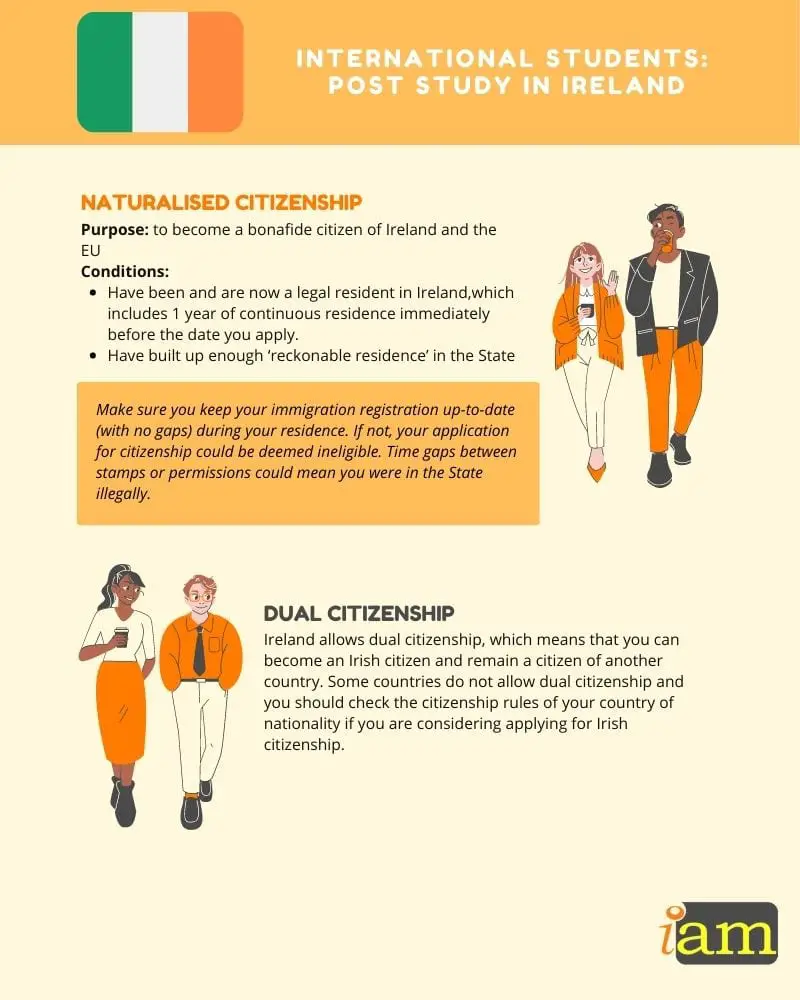
To apply for citizenship by naturalisation based on residence, you must prove that you:
- Have been and are now a legal resident in Ireland
You must prove that you have been legally resident in the State for at least 5 years out of the last 9 years. This includes 1 year of continuous residence immediately before the date you apply.
You can do this by showing your immigration permission stamps or documents from the Department of Justice indicating your permissions granted. - Have built up enough ‘reckonable residence’ in the State
You must show that you built up enough reckonable residence in the State to be granted citizenship, specifically:- 1825 or 1826 days of reckonable residence based on your accumulated permission stamps
- This includes 365 or 366 days (1 year) of continuous residence immediately before the date you apply
Make sure you keep your immigration registration up-to-date (with no gaps) during your residence. If not, your application for citizenship could be deemed ineligible. Time gaps between stamps or permissions, could mean you were in the State illegally.
Documents to send as proofs of residence:
- If you are employed, you must send your P60 for years up to 2018 or Employment Detail Summary from 2019 onwards or if you are in receipt of a payment from the Department of Social Protection you must provide a statement of payments/benefits received for each year.
- Mortgage statements if you own your home or tenancy/rental agreement if you are renting.
- Bank Statements for at least 3 months of each year showing day-to-day transactions and or Direct Debits for utility bills. Online shopping transactions are not sufficient as proof of residence in the State.
- For the current year, you should submit an employment letter from your current employer, which includes your name, address, date you commenced work with the employer along with 3 recent payslips.
Ireland allows dual citizenship, which means that you can become an Irish citizen and remain a citizen of another country. Some countries do not allow dual citizenship and you should check the citizenship rules of your country of nationality if you are considering applying for Irish citizenship.
Most applications for naturalisation are processed within 12 months.
So, are you ready to explore your options in Ireland? Comment below.
IaM can help with your visa application to the United States, the UK & other countries
If you need help with a US visa, a UK Visa, or visa to Europe, including help with appointment booking obligations, IaM can help. For more information and advice on US immigration, UK immigration law and US visa applications or if you need any help or assistance please, reach out to your Visa Coordinator at IaM.
- Who’s Affected by the US's Latest Travel Ban? - 5 June 2025
- UK Redesigns Airspace for a Sustainable Future - 4 June 2025
- Top 5 Schengen Countries Most Likely to Reject Your Visa in 2025 - 3 June 2025










